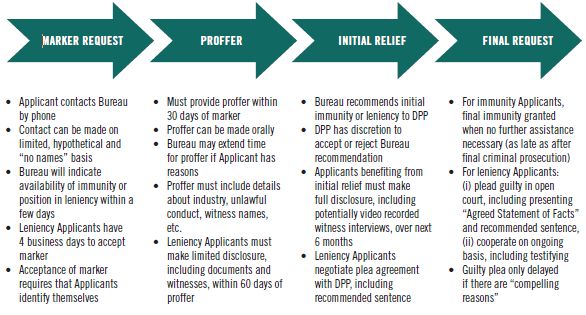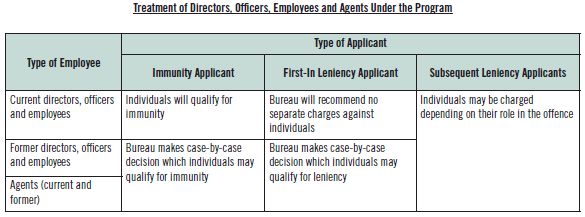An updated cartel immunity and leniency program (the "Program") has been issued in Canada. Key takeaways for businesses and international practitioners are as follows:
- Under the Program, companies and individuals that self-report unlawful conduct (e.g., cartels) in Canada can benefit from (i) immunity from prosecution or (ii) leniency in the form of a significant reduction in the amount of the recommended fine.
- While the process of applying for immunity or leniency can be "paperless", the Canadian Competition Bureau (the "Bureau") may record witness interviews. Plaintiffs might seek disclosure of these recordings from the Bureau in follow-on litigation.
- A final grant of immunity may be delayed until long after an applicant has provided full cooperation.
- Applicants should carefully assess how the operation of the Program – including with respect to waivers and the timing of obligations – interacts with the operation of immunity and leniency programs in other jurisdictions.
Background
The Commissioner of Competition, who is the head of the Bureau, is responsible administering and enforcing of Canada's Competition Act (the "Act"), including its criminal cartel provisions. After investigating a cartel, the Bureau may recommend to the Director of Public Prosecutions (DPP) that a defendant be charged criminally. The DPP makes the final determination whether to file charges against a defendant. If charges are filed, the DPP must prove to a court the defendant's guilt beyond a reasonable doubt.
The Program provides companies and individuals that have engaged in criminal activity incentives to self-report to the Bureau; such self-reporting helps the Bureau detect and investigate cartels.
In the past few years, the DPP was unsuccessful in high profile cartel cases in court and declined to prosecute another high profile cartel. These outcomes were attributed to perceived shortcomings with the prior version of the Program; among other things, there was concern that applicants under the Program (the "Applicants") were not compelled to continue their cooperation until trial. This updated version of the Program, issued by both the Bureau and the DPP, is designed to address these perceived shortcomings.
Immunity and Leniency Process
The process for applying for immunity or leniency is complex. Importantly, the application process can be paperless, but the Bureau may seek to audio or video record the interviews of an Applicant's witnesses. Set out below is a chart detailing the main procedural steps for companies applying under the Program. Participation in the immunity and leniency processes requires careful strategic decision-making by Applicants at every stage (particularly for Applicants seeking immunity or leniency in other jurisdictions simultaneously).

Fine Calculation for Leniency Applicants
Under the Program, immunity Applicants are not subject to criminal conviction or any type of state sanction (although immunity Applicants may be subject to civil damages actions).
Leniency Applicants, by contrast, are expected to plead guilty and have a sentence entered by a court (leniency Applicants may also be subject to civil damages actions). Under the Program, the DPP and the Applicant will submit a recommended sentence to the court, which is calculated by determining the base fine, taking account of aggravating and mitigating factors, and then subtracting credits and discounts based on participation in the Program.
- Base Fine. The "base fine" is calculated as a percentage of the affected volume of commerce in Canada. The Bureau will use 10% as a proxy for the overcharge, but will also consider evidence that a lower overcharge is appropriate. Added to this amount is an additional 10% for deterrence and to ensure the fine is not a mere cost of doing business.
- Plus Aggravating Factors. The amount of the base fine is increased if there exist aggravating factors, which can include recidivism; coercion or instigation; a large corporate size or market share; vulnerable nature of the victims; or a high level of senior officer involvement.
- Minus Mitigating Factors. The base fine is decreased if there exist mitigating factors, which can include restitution of victims outside of civil damages suits; early termination of the unlawful conduct; a reduced ability to pay; or the existence of a compliance program that is credible, effective and consistent with the Bureau's Bulletin on Corporate Compliance Programs.
- Minus Leniency Plus Credit. The base fine will be decreased by 5-10% if the Applicant provides evidence of further unlawful conduct (i.e., either a separate cartel, or unlawful conduct that is broader (e.g., longer) than previously known by the Bureau). The Applicant will receive immunity for that additional disclosure, and an additional reduction in the recommended fine for which the Applicant is receiving leniency.
- Minus Leniency Discount. The fine will be discounted by up to 50%. The level of discount the DPP will agree to depends upon the value of the Applicant's cooperation to the Bureau's investigation, which is determined by reference to a number of factors: the timing of the application; the timeliness of the Applicant's disclosure; the availability, credibility and reliability of the Applicant's witnesses; and the relevance and materiality of evidence produced by the Applicant.
Employees
The Program also provides relief for individuals associated with immunity or leniency Applicants. The nature of that relief varies depending upon (i) the Applicant's status in the Program and (ii) the individual's status with the Applicant. The table below describes the different forms of relief offered to individuals associated with Applicants.

To be eligible to benefit from the Program, (i) an individual must admit knowledge of or participation in the cartel and be prepared to cooperate in a timely fashion with the Bureau's investigation, and (ii) Applicants must identify the individual to the Bureau. The Bureau will extend available relief to such individuals in all cases except where the individual will not admit her or his knowledge of or participation in the cartel, or fails to cooperate in the manner required.
Of Interest to International Practitioners
Aspects of the Program will be of particular interest to international practitioners. Notably:
- Recordings / Potentially Discoverable Material. The Bureau will seek to interview the Applicant's witnesses (i.e., current and former employees). These interviews may be conducted under oath and video recorded; the purpose of recording is to impeach or cross-examine a witness if their court testimony is inconsistent with information previously provided. It is unclear whether or what legal privilege might protect such recordings, and there is a risk that plaintiffs might seek third party disclosure of such recordings from the Bureau in follow-on litigation.
- Applications in Other Jurisdictions. The Program requires that at the proffer stage, absent compelling reasons, an Applicant identify all of the other jurisdictions where the Applicant is applying for immunity or leniency.
- Waivers. The Program provides that the Bureau expects that Applicants, absent compelling reasons, will provide waivers of confidentiality "immediately" to permit the Bureau to communicate with agencies in other jurisdictions where the Applicant is applying for immunity or leniency.
- Timing Considerations. The Program provides for an application process with numerous prescribed time periods. The Program warns that the Bureau will not delay operation of these time periods solely because an Applicant has commitments arising out of immunity or leniency applications in other jurisdictions.
Conclusion
The updated Program provides valuable incentives for parties to unlawful conduct to self-report, but the Program's operation is complex and requires careful strategic decision making by Applicants (particularly those whose conduct involves multiple jurisdictions).
The content of this article is intended to provide a general guide to the subject matter. Specialist advice should be sought about your specific circumstances.

